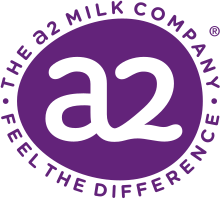The a2 Milk Company
 |
|
| Traded as | ASX: A2M NZX: ATM |
|---|---|
| Predecessor | A2 Corporation Limited |
| Founded | 2000 in New Zealand |
| Founders |
Dr Corran McLachlan, Howard Paterson |
| Headquarters | Sydney, Australia |
|
Areas served
|
Australia, China, Hong Kong, Malaysia, New Zealand, Singapore, United States of America, United Kingdom |
|
Key people
|
Geoffrey Babidge (CEO) David Hearn (Chairman) |
| Products | A2 Milk, Dairy, infant formula |
| Revenue |
|
| Profit |
|
| Total assets |
|
| Total equity |
|
|
Number of employees
|
|
| Website | www |
The a2 Milk Company Limited (previously known as A2 Corporation) is an ASX 200 public listed company that commercialises intellectual property relating to a2 milk and related products. The a2 Milk Company is also a major Australian and New Zealand producer of the trademarked a2 Milk, a2 Platinum infant formula, and other dairy food products, supplying to local and international markets.
The a2 Milk Company is the successor of A2 Corporation Limited, a New Zealand company founded in 2000 by Dr Corran McLachlan, who was researching health effects of A1 beta-casein; and Howard Paterson who was one of New Zealand's richest men, a significant dairy farmer, and an important stakeholder in Fonterra, a dairy cooperative. The company commercialised a genetic test to determine whether a cow will produce milk without the A1 protein, and to market a2 Milk.
Initially, A2 Corporation focused on dairy farm breeding programs to develop herds that would produce only a2 milk. However the launch of a2 milk was delayed by opposition from Fonterra, which had protected contracts under New Zealand law with about 98% of New Zealand dairy farms. Seeking leverage in the battle with Fonterra over access to farmers, and over patent rights, Howard Paterson, the CEO of A2 Corporation, led the company into litigation against Fonterra, asking the New Zealand High Court to order Fonterra to put health warnings on its conventional milk concerning risks of type 1 diabetes, heart disease, autism and schizophrenia due to the presence of A1 beta-casein, and to force Fonterra to publicly disclose all the information it had about the links between A1 beta-casein and health risks. The litigation threatened New Zealand's economy and international reputation as at the time Fonterra was responsible for 20% of New Zealand's exports. The press over the litigation and public concern over the claims of A2 Corporation led the New Zealand Food Safety Authority and the Ministry of Health and the Food Standards Australia New Zealand to issue statements confirming the safety of conventional milk.
...
Wikipedia
